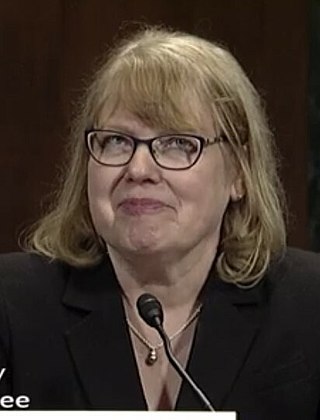
An associate justice of the Supreme Court of the United States is a justice of the Supreme Court of the United States, other than the chief justice of the United States. The number of associate justices is eight, as set by the Judiciary Act of 1869.

The Supreme Court of the United States (SCOTUS) is the highest court in the federal judiciary of the United States. It has ultimate appellate jurisdiction over all U.S. federal court cases, and over state court cases that turn on questions of U.S. constitutional or federal law. It also has original jurisdiction over a narrow range of cases, specifically "all Cases affecting Ambassadors, other public Ministers and Consuls, and those in which a State shall be Party." The court holds the power of judicial review: the ability to invalidate a statute for violating a provision of the Constitution. It is also able to strike down presidential directives for violating either the Constitution or statutory law.

Horace Gray was an American jurist who served on the Massachusetts Supreme Judicial Court, and then on the United States Supreme Court, where he frequently interpreted the Constitution in ways that increased the powers of Congress. Noted for possessing a sharp mind and an enthusiasm for legal research, he was also a staunch supporter of the authority of precedent throughout his career, and would write landmark opinions in cases such as Elk v. Wilkins, Pollock v. Farmers' Loan & Trust Co. and United States v. Wong Kim Ark.

The demographics of the Supreme Court of the United States encompass the gender, ethnicity, and religious, geographic, and economic backgrounds of the 116 people who have been appointed and confirmed as justices to the Supreme Court. Some of these characteristics have been raised as an issue since the court was established in 1789. For its first 180 years, justices were almost always white male Protestants of Anglo or Northwestern European descent.

Neil McGill Gorsuch is an American jurist who serves as an associate justice of the Supreme Court of the United States. He was nominated by President Donald Trump on January 31, 2017, and has served since April 10, 2017.

Ketanji Onyika Brown Jackson is an American lawyer and jurist who is an associate justice of the Supreme Court of the United States. Jackson was nominated to the Supreme Court by President Joe Biden on February 25, 2022, and confirmed by the U.S. Senate and sworn into office that same year. She is the first black woman and the first former federal public defender to serve on the Supreme Court. From 2021 to 2022, Jackson was a United States circuit judge of the United States Court of Appeals for the District of Columbia Circuit.

The nomination and confirmation of justices to the Supreme Court of the United States involves several steps, the framework for which is set forth in the United States Constitution. Specifically, Article II, Section 2, Clause 2, provides that the president of the United States nominates a justice and that the United States Senate provides advice and consent before the person is formally appointed to the Court. It also empowers a president to temporarily, under certain circumstances, fill a Supreme Court vacancy by means of a recess appointment. The Constitution does not set any qualifications for service as a justice, thus the president may nominate any individual to serve on the Court.

Allison Lynn Hartwell Eid is a United States circuit judge of the United States Court of Appeals for the Tenth Circuit. She previously served as an associate justice of the Colorado Supreme Court.
Evan Andrew Young is an American lawyer who has served as a justice of the Supreme Court of Texas since 2021.






